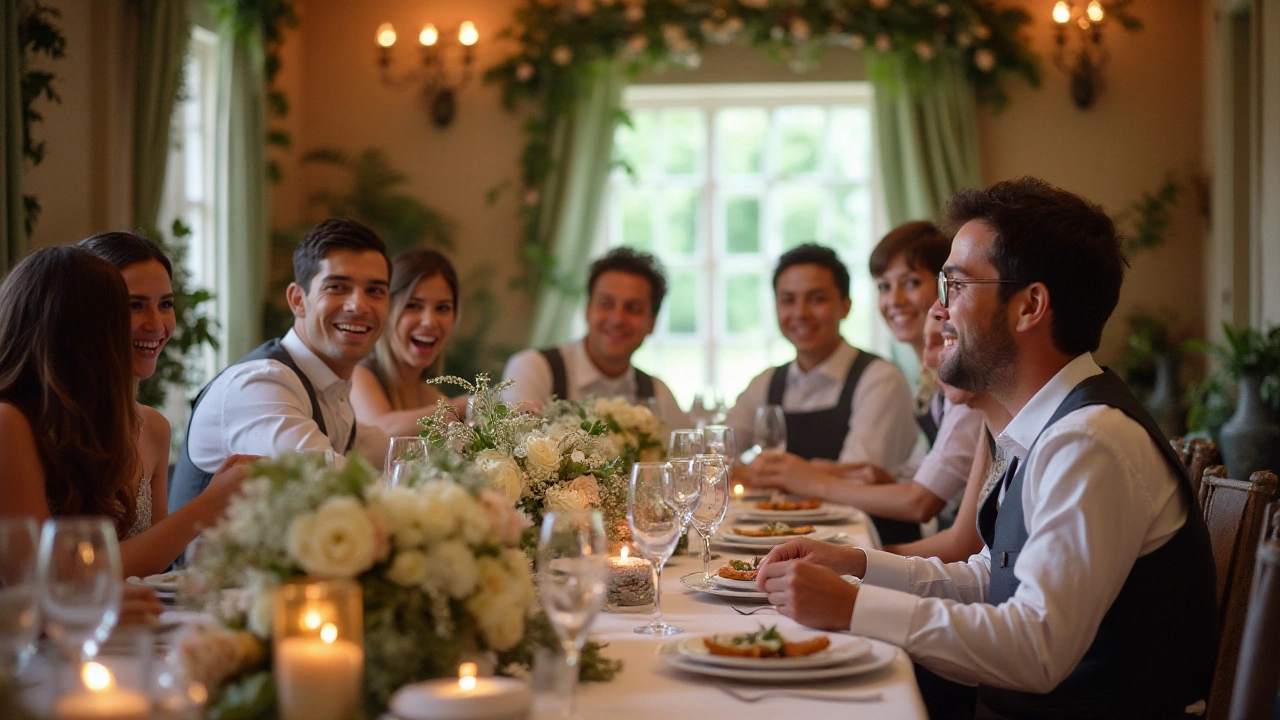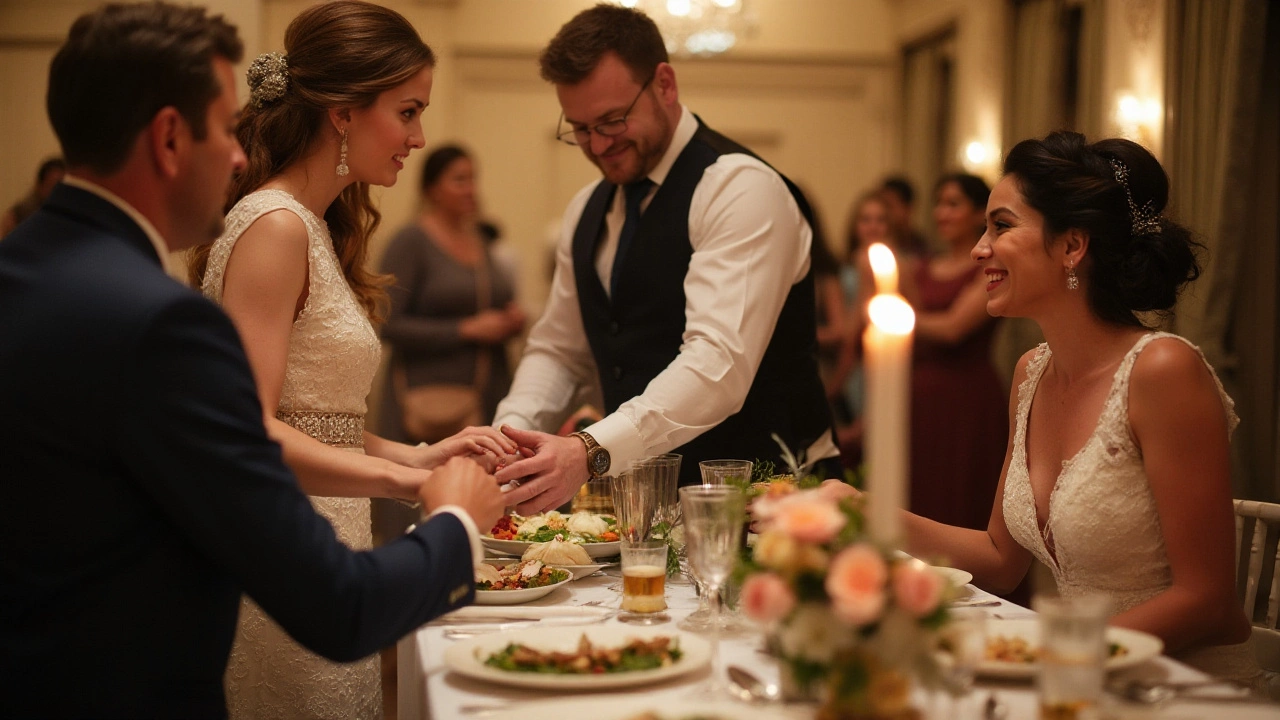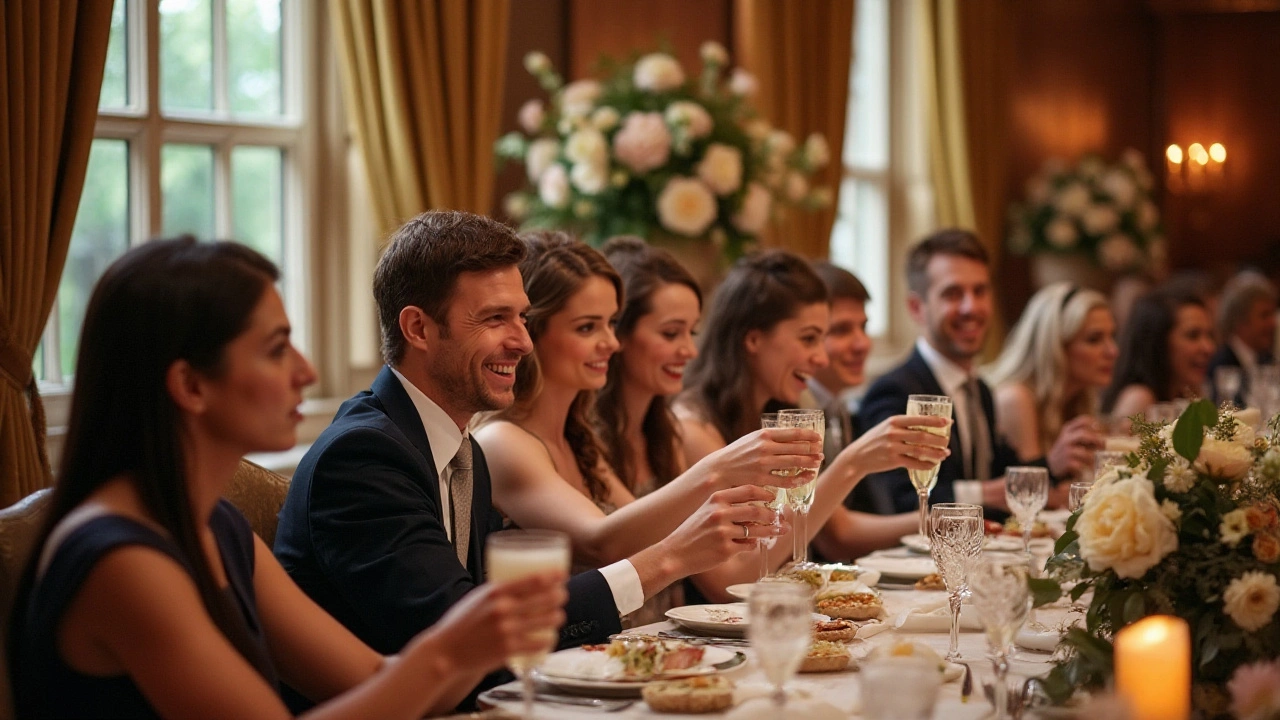In the exciting whirlwind of wedding planning, numerous details demand your attention, from the awe-inspiring flowers to the perfect playlist. Amidst all these arrangements, one question might sneak its way onto your checklist: Should you be feeding the catering staff at your wedding?
It's not just a kind gesture but can also play a critical role in the overall execution of your special day. This decision affects not just your budget but also the atmosphere and efficiency of your event. So, let’s delve into understanding the importance of feeding the staff and explore practical ways to make it happen without a hitch.
- Why Consider Feeding the Catering Staff
- Budgeting for Additional Meals
- Communicating with Your Catering Team
- Creative Meal Options for Staff
- Understanding the Benefits
Why Consider Feeding the Catering Staff
When orchestrating a wedding, it's easy to focus solely on the guests and overlook the team working diligently behind the scenes. These are the individuals ensuring that your event runs smoothly, from whipping up the perfect dishes to keeping glasses filled. The wedding catering staff are your behind-the-scenes heroes, vital in keeping the momentum of the evening alive. A well-fed team is not just more energetic but also more eager to provide the best service. Let's dive into why offering meals to the staff is a crucial component of a seamless wedding experience.
The notion of feeding the catering staff might initially seem unnecessary, especially when you're closely watching your wedding budget. However, consider this: staff like waiters, chefs, and coordinators often work upwards of eight to twelve hours straight. Without adequate nourishment, their performance can falter, potentially affecting the quality of service at your event. A happy team is an effective team, and feeding them assures their energy levels and morale remain high.
"Keeping staff nourished is like fueling the engine of your celebration. It ensures they have the stamina to keep everything running smoothly," says wedding planner Andrea S. from Bridal Bliss Events.
Aside from maintaining energy, providing meals for your catering crew demonstrates a level of appreciation and respect that can foster a more positive work environment. This gesture can be as important as any grandiose decoration or exquisite menu item. Acknowledging their hard work can motivate them to go that extra mile to make your evening special. Everyone enjoys being appreciated, and offering a meal is a small token of gratitude that can leave a lasting impact.
Moreover, including staff meals in your wedding meal plan is increasingly becoming standard procedure in many venues and catering contracts. It's often embedded into initial discussions and quotes with your caterers. However, it's important to clarify these details early on to ensure expectations are aligned and to avoid any last-minute surprises. Including this in initial conversations solidifies your role as a considerate host and helps your catering team prepare adequately for the day.
Imagine, if you will, your own appetite during a high-energy, exciting event. With adrenaline as a constant companion, your needs for sustenance can become overlooked until hunger suddenly strikes. Now, think of your staff experiencing the same adrenaline rush without the luxury of snacking. Planning for these breaks not only looks after their well-being but also ensures they can fully focus back on their tasks, having had a moment to recharge.
Some might argue that time constraints make it hard for staff to have a dedicated meal break, but many catering companies have embraced creative solutions. They might organize rotating meal breaks or set up a designated area where the team can quickly recharge while still staying on top of deadlines. Feeding the serving meals to the team should be seamlessly incorporated into your event timeline for optimal efficiency.
Ultimately, considering to feed the catering staff at your wedding is a thoughtful decision that can contribute to a smooth and successful event. It highlights your appreciation, boosts staff’s productivity, and lays the groundwork for a memorable celebration. Taking these little steps in planning can make a significant difference in how your wedding day unfolds.
Budgeting for Additional Meals
When planning a wedding, keeping an eye on the budget can feel like walking a tightrope. Including the catering staff in your meal plans might seem like a small detail, but it can make a big difference in your budget. As you think about allocating funds, it helps to understand the factors that influence the decision of feeding the staff—and how these choices affect the overall financial picture of the wedding.
The first step in deciding whether to include meals for the catering staff is understanding how many extra meals you'll need. Typically, catering teams range from chefs and sous chefs to servers and coordinators. Depending on the size of your guest list and the service style, you might have a team of five or thirty staff members. A candid conversation with your caterer will help ascertain the exact number your event requires without overspending.
While adding these meal expenses might initially seem cumbersome, consider this: the hospitality and efficiency a well-fed staff provides can actually enhance your guest experience. A content staff is likely more motivated and energetic, which can translate into a seamless service. According to New Zealand-based wedding planner Sophie Banks, "An investment in staff meals is an investment in impeccable service."
“It's money well spent. If your staff is energized and happy, your guests will feel that energy,” Sophie Banks notes.Balancing the financial equation can be about the trade-offs and potential benefits feeding the staff brings.
Once you've determined the number of extra meals, you might wonder how much to allocate. Traditionally, catering staff meals are approximately half the cost of the guest meals since they are often simplified versions of the same menu or entirely different and budget-friendly options. To manage costs effectively, you could discuss with your caterer about practical, hearty meals that won't require elaborate plating or preparation, such as pastas, sandwiches, or casseroles. These meals can be prepared in advance and provide the nourishment needed without stretching your budget thin.
If you're a numbers person, consider creating a small table to organize your meal budget:
| Number of Staff | Cost per Staff Meal | Total Cost |
|---|---|---|
| 10 | $20 | $200 |
| 20 | $15 | $300 |
As with any budget line item, open communication with your wedding coordinator and the catering team is crucial. Regular check-ins ensure that your budget remains intact and that adjustments, when necessary, don't turn into surprises. Alongside budgeting, consider the overall logistics, such as when and where the team will take their meal break, to ensure everything runs smoothly without any interruptions to the service flow. This attention to detail can make immense contributions to making the day as perfect as envisioned, leaving you and your guests free to enjoy every magical moment.

Communicating with Your Catering Team
Open and effective communication with your wedding catering team is crucial for ensuring that everything runs smoothly on your big day. It's not just about providing them with instructions but creating a collaborative environment where they feel valued and understood. Start by having an initial meeting where you discuss the flow of the day in detail, covering necessary components such as the timelines, number of guests, and specific dietary needs. It's also important to confirm if you're including the staff in your meal arrangements, outlining expectations on both sides. Clear communication sets the tone and can greatly enhance the efficiency and demeanor of the staff, as they know they are supported and appreciated. They, in turn, will be more motivated to deliver exceptional service.
Another vital aspect to address is how the team should interact with the guests and vendors. Clear guidelines on guest engagement can be beneficial. For example, some weddings might prefer a more discreet service, where the focus remains entirely on the event without unnecessary interruptions. But then, on the other hand, some couples may welcome a warm, interactive approach by the catering staff. These preferences should be discussed openly. When teams align on execution style, it helps create a seamless experience for everyone involved in the meal plan.
Keep in mind the importance of periodically updating the team on last-minute changes, whether they are related to the schedule or guest count. In the world of weddings, changes are to be expected. A quick call or email if something shifts is always appreciated and helps everyone stay on track. If you’re in touch with a wedding planner, they frequently act as a liaison to ensure your catering team is up-to-date. This collaborative relay of information can prevent many potential issues from arising. As Teddy Roosevelt said, "The single most important ingredient in the formula of success is knowing how to get along with people."
Involving the Lead Caterer
Engaging closely with the lead caterer or head chef is particularly beneficial. They are the ones steering the team on the day and having them in the loop naturally translates to a more organized service. Discuss the specific roles within the team, identify the point of contact on the day itself, and establish a line of emergency communication. Knowing who to approach if something doesn't go as planned is crucial. Discuss the breakdown of tasks and sections they will manage. Whether it's prepping cocktails, hors d'oeuvres, or the dessert station, each should have a designated supervisor with a detailed plan for their area of responsibility. This level of detailed communication with the catering team is often a game-changer for setting a suave, professional tone for your wedding reception.
Once you've got the basic arrangements sorted, there are some smaller details that really add a personal touch. For example, you might want to let your catering team know about the background stories related to your menu choices. Maybe the main dish is a favorite meal from your first date, or the dessert is inspired by a family recipe. Sharing these nuggets can give the catering staff a deeper understanding of their role in creating a memorable, personal experience for you and your guests. This way, not only is the culinary journey coherent, but it also resonates more deeply with what's important to you as a couple.
Creative Meal Options for Staff
When it comes to planning your wedding, offering a meal for the catering staff might seem like the smallest of details, but it can have significant implications for your event. Serving delightful, practical, and nutritious meals to the hardworking team ensures they remain energetic and efficient throughout your special day. While it's easy to dismiss this meal as a bare-bones necessity, putting a dash of creativity into the offerings can enhance staff morale and professionalism, which in turn benefits your event.
First, it’s wise to consider meals that are simple yet satisfying. Choose dishes that transport well and can be prepared in advance to avoid disruption during the critical stages of your wedding. A wholesome chicken or vegetarian stir-fry with fresh vegetables not only stands out in terms of flavor but also provides balanced nutrition necessary for keeping energy levels high. Another idea could be to serve a comforting pasta salad with seasonal veggies and light dressing, easy to enjoy on the go.
Exploring local cuisine can add an authentic twist, especially if your wedding theme permits. Here in Auckland, integrating a Kiwi touch with meals like a lamb roast wrap complete with locally sourced produce can offer the staff a taste of New Zealand’s traditional fare. Similarly, serving warm, hearty pies filled with meat or cheese and vegetables can be quite filling and uplifting for those long hours.
Another option to consider would be offering a buffet-style setting that allows staff to choose meals that suit their dietary restrictions. Offering variety could include dishes such as grilled fish, fresh salad options, dense whole-grain bread, and an assortment of condiments. Not only does this keep everyone satisfied, but it also demonstrates your thoughtful inclusion of various preferences, which can boost morale significantly.
"Feeding your staff is just as crucial as feeding your guests," says renowned Auckland event planner, Olivia Nash. "A well-fed team performs better, and happy staff often translate into a smooth, enjoyable event for the couple and their guests."
Additionally, try to include a delightful dessert option. It doesn’t have to be extravagant; perhaps a selection of local fruits like kiwifruit, passion fruit, and apples served with a small portion of pavlova could leave a sweet, lasting impression. If your event is during colder months, including a warm dessert like sticky date pudding can be comforting for the team.
When organizing the best creative meal options, remember to align your ideas with your budget and the catering company's capabilities. With a bit of imagination and attention to detail, providing your catering staff with a delightful meal can contribute to the seamless flow of your wedding. Not only will it leave a lasting impression on those behind the scenes, but it directly enhances their energy and mood, ensuring they provide the best possible service on your big day.
| Popular Meal Options | |
|---|---|
| Option | Description |
| Kiwi Lamb Wrap | A wrap filled with traditional New Zealand lamb and seasonal vegetables. |
| Vegetarian Stir-fry | Colorful vegetables served with tofu and a light soy sauce. |
| Sticky Date Pudding | A warm dessert option ideal for colder months. |

Understanding the Benefits
When planning a wedding, many couples meticulously detail every part of their day, from the ceremony right through to the reception. Yet, one aspect that sometimes gets overlooked amid the grandeur is the importance of catering staff. Feeding the team that keeps the celebration running smoothly isn't just an act of kindness—it's actually a practical decision that can enhance the entire event. When your catering crew is well-fed, they're able to perform their duties more efficiently and with a higher level of satisfaction. Providing meals can prevent small hiccups that turn into significant delays. Instead of worrying about when they can pause to grab a bite, your team will focus on presenting the best meals to your guests, ensuring a seamless experience from start to finish.
The wedding day hours are long for everyone involved, but especially so for those behind the scenes. While guests enjoy the festivities, the catering staff's responsibilities range from setting up dining arrangements to serving meals, managing special requests, and finally, cleaning up. Ensuring they have a meal break can be considered part of maintaining workplace standards and should be viewed as a necessity rather than a perk. A meal break boosts energy levels and doubles as a morale booster that encourages everyone to work with renewed vigor. It shows appreciation and acknowledgment of their hard work, which in turn, cultivates a positive work environment.
Building a Harmonious Atmosphere
Feeding the catering staff can help foster a harmonious atmosphere. Imagine the dynamic energy in a space when everyone feels valued and at ease. When staff know their well-being has been taken into account, there's an uplift in the overall ambiance. It’s one less thing for them to worry about, removing tension and stress that might otherwise affect their interactions with your guests. In essence, it’s a cycle of positive reinforcement: a happy staff contributes to a memorable wedding experience.Consider this perspective: "When the team is taken care of, the care is reflected in every plate they serve," shares Marcia Butler, a seasoned wedding planner. A simple gesture goes a long way in smoothing the road to a perfect wedding. Many experienced planners and couples have come to realize this golden rule: investing in the people who help bring the day to life always pays off.
A noteworthy point to consider is that allocating meals for staff doesn’t necessarily mean extravagant spending. Instead, couples can choose from a variety of cost-effective meal options that fit within their budget. Oftentimes, it can be coordinated with the catering manager to design a meal plan that’s separate but equally satisfying for the staff. A simple pasta dish, sandwiches, or even warm hearty soups can make a vast difference in the workflow.
With thoughtful consideration and a modest allocation in the wedding budget, feeding the staff becomes a small yet integral part of planning. By opting to include the catering team in your meal preparations, you’re not only ensuring a well-coordinated event but also imparting gratitude, which resonates far beyond the actual day. Thus, such gestures contribute significantly to the harmonious success of your once-in-a-lifetime celebration.

